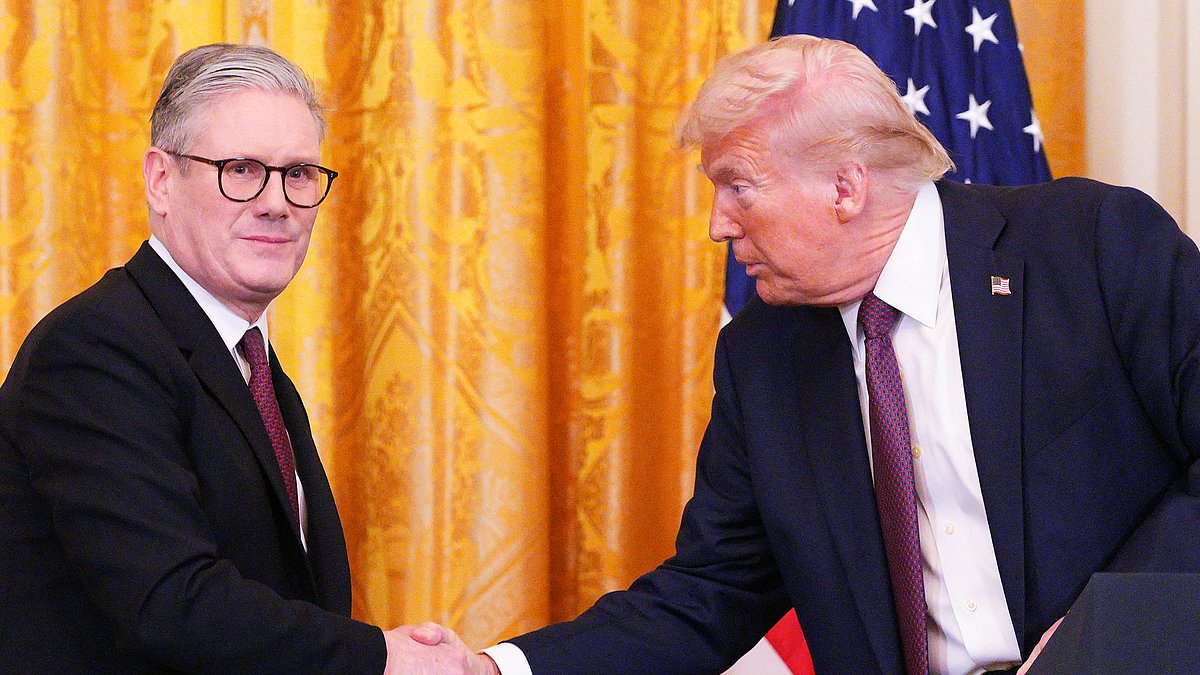Keir Starmer is resisting pressure to retaliate today after failing in his bid to persuade Donald Trump to spare Britain from brutal tariffs on steel.
The US president has pushed ahead with the 25 per cent levy on steel and aluminium imports despite desperate pleas for an exemption.
But the PM has stopped short of tit-for-tat tariffs – which have been immediately imposed by the EU – with allies saying he will keep a ‘cool head’.
Ministers this morning denied that the response was ‘weak’, as the industry warned of a huge hit coming at the ‘worst possible time’.
Business Secretary Jonathan Reynolds stressed he is trying to strike a wider trade deal with the US – something Mr Trump hinted at during Sir Keir’s White House love-in last month.
Sir Keir made a final attempt to head off the measures in a phone call with Mr Trump on Monday night. However, UK industries were then told to brace themselves for the impact of the tariffs, which came into effect at 4am.
Trade association UK Steel branded the US move ‘hugely disappointing’.
Director General Gareth Stace said: ‘President Trump must surely recognise that the UK is an ally, not a foe. Our steel sector is not a threat to the US but a partner to key customers, sharing the same values and objectives in addressing global overcapacity and tackling unfair trade.
‘These tariffs couldn’t come at a worse time for the UK steel industry, as we battle with high energy costs and subdued demand at home, against an oversupplied and increasingly protectionist global landscape. What’s more, the EU is also pushing ahead with trade restrictive action that will amplify the impact of US tariffs.’
Mr Stace added: ‘It is essential that the UK Government not only continues efforts to negotiate exemptions with the US but also takes decisive action to bolster our trade defences.’
Britain exported 166,433 tonnes of steel to the US in 2023, the last full year for which figures are available.
Statistics from trade body UK Steel showed that in 2024 some 162,716 tonnes were sent to the US, but that does not yet include data from December.
The US is the industry’s second-largest export market after the EU, although the Government said it only accounted for 5 per cent of UK steel exports in 2023.
Touring broadcast studios this morning, Treasury minister James Murray was pressed on whether the UK was showing weakness.
He told Sky News: ‘Well, we’re in a very different position than the EU as a result of the Prime Minister’s trip to Washington last month.
‘The UK and the US have been negotiating rapidly for an economic agreement, and so we’re in a position where that negotiation is ongoing and these global tariffs, if you like, have landed in the middle of that work. So we don’t want to be pushed off course by this.
‘We want to carry on with our rapid negotiation toward an economic agreement, because we think that’s in the best interest of British businesses and the British public.’
Mr Murray said the UK should avoid a ‘knee-jerk response’.
‘We think the right response is to continue pragmatically, cool-headedly, without a knee-jerk response, but toward our economic agreement that we’re negotiating with the US to secure, because that’s in the best interests of the UK.’
In a statement overnight, Mr Reynolds insisted ‘all options’ were on the table to respond in the national interest.
‘It’s disappointing the US has today imposed global tariffs on steel and aluminium,’ he said.
‘We are focused on a pragmatic approach and are rapidly negotiating a wider economic agreement with the US to eliminate additional tariffs and to benefit UK businesses and our economy.
‘Meanwhile we remain resolute in our support for UK industry. This Government is working with affected companies today, and I back industry’s application to the Trade Remedies Authority to investigate what further steps might be necessary to protect UK producers.’
‘I will continue to engage closely and productively with the US to press the case for UK business interests. We will keep all options on the table and won’t hesitate to respond in the national interest,’ he added.
Brussels said counter-measures to the tariffs, which would affect around 26 billion euros (around £22 billion) of EU exports, will be introduced in April ‘to defend European interests’.
During Sir Keir’s visit to the US, Mr Trump dropped hints the UK would be spared from the worst of his tariffs, saying the PM had been ‘working hard’ to convince him over lunch.
The president also said he was hoping for a ‘very good’ Transatlantic trade agreement to avoid the need for levies.
He set alarm bells ringing by insisting he considered VAT as tax that was causing an imbalance in trade, threatening ‘reciprocal’ tariffs to offset the charge. In fact, VAT is a sales tax.
The aluminium industry body had earlier warned the looming import taxes were already having an effect.
Nadine Bloxsome, chief executive of the Aluminium Federation, said: ‘The UK aluminium sector is already seeing the first impacts of these tariffs.
‘The sharp rise in US premiums has created new incentives for scrap exports, raising the risk of significant domestic scrap leakage. This not only weakens the UK’s recycling capacity but risks undermining our sustainability objectives and circular economy targets.
‘Additionally, the uncertainty around potential trade diversion is placing considerable pressure on UK producers, especially as semi-finished goods may flood the UK market at lower costs.’
William Bain, head of trade policy for the British Chambers of Commerce (BCC), said the decision plunged both countries ‘into a new age of uncertainty’.
But he warned against a series of ‘tit-for-tat’ tariffs that could ‘easily spiral into an all-out trade war’.
‘We must keep talks alive and retaliatory tariffs should only be used as a means of last resort. If talks succeed, it would be a win-win, bringing welcome stability and pro-growth economic conditions for both sides.’
